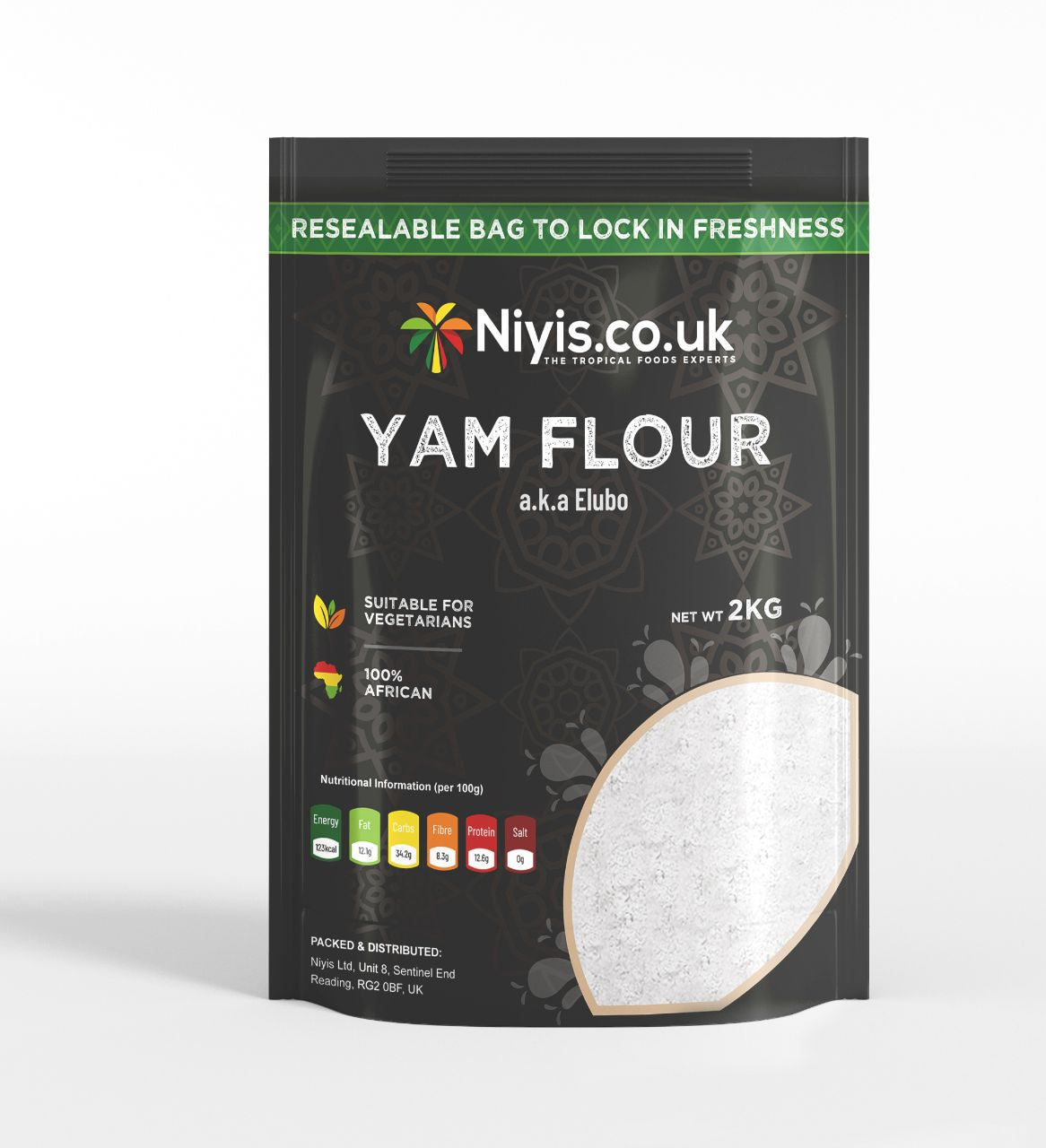
Niyis Yam Flour (Elubo For Amala)


Pairs well with
Description
Introducing Niyis Yam Flour, also known as Elubo for Amala, in a convenient pack perfect for preparing traditional African dishes. Sourced from premium quality yams, this flour is finely ground to ensure authenticity and optimal texture. Whether you're craving the rich taste of amala or looking to create other yam-based delicacies, Niyis Yam Flour promises to deliver the authentic flavors and textures you love. Elevate your culinary experience with Niyis Yam Flour and enjoy the convenience of preparing delicious and wholesome meals at home.
Specifications
Shipping & Delivery
Free shipping on orders over £120.
📦Order before 11am for next working day delivery across the UK.
Powered by ParcelForce and DPD.
📍Free Click & Collect available, usually ready in 24 hours at:
Niyis Supermarket
Trade City
Reading RG2 0BF
United Kingdom
Hear from our customers
We were very happy with the catfish we ordered, they were delicious and arrived in a good condition. Turkey giblets for the cats were also good quality, they liked them. Posting was fast, thank you.
We are really pleased, order came really.fast, had emails and a call to confirm delivery, we bought frozen goat, it was really well packaged and still frozen and great quality meat. Made curried goat, delicious. Couldn't be happier, will definitely use Niyis again. Thank you Niyis
Very fresh affordable products, staff are very friendly and never missed to update you if any items are out of stocks and delivery. Amazing place to shop online. Very friendly admin. Highly recommended, satisfied customer 😊😊
FAQs
Can I order fresh produce from your store?
Yes! We offer pre-order fresh produce. Fresh leaves are shipped every Wednesday, and fresh vegetables/fruits every Monday. Make sure to check the product descriptions for details on when items will be dispatched.
How is my frozen food shipped?
To ensure frozen items arrive in perfect condition, we pack them with ice packs and cold pouches. Shipping fees for frozen items are included in the delivery cost, and we cover part of this cost for you. We use ParcelForce and DPD for reliable next-day delivery.
What delivery options are available?
We offer several delivery options to cater to your needs:
- Click and Collect:
Free at our Reading warehouse (Unit 8, Sentinel End, RG2 0BF). Pick up your order within 48 hours (24 hours for fresh or frozen items). - Standard Shipping: 2-4 working days. Costs vary depending on location (from £3.99 for Reading, £5.99 for the rest of the UK).
- Express Delivery: 1 day delivery for the UK, starting from £7.99 (excluding Northern Ireland).
- Next Working Day Delivery: Orders placed by 11 am will arrive the next working day. Prices start from £4.99 for Reading.
- Saturday Delivery: Available for £19.99 (except Northern Ireland).
Can I cancel my order after it has been packed?
We understand that sometimes plans change. However, if your order has already been packed, we charge a 5% fee (for orders over £100) to cover packaging costs and staff time. If your order has already shipped, we can only refund non-perishable items once the package is returned to us in good condition. Please note, fresh or frozen items are non-refundable once shipped.
Do you offer free shipping?
Yes! We offer free shipping for orders over:
- £150 for Scotland
- £200 for Northern Ireland
- £120 for the rest of the UK (excluding VAT).
Check your cart at checkout to see if your order qualifies for free shipping.
How do I track my order?
Once your order is dispatched, we will send you an email and SMS with
tracking details. You can also reach our customer service team for
updates. Please make sure to provide your phone number during checkout to receive notifications.
Do you deliver outside the UK?
At the moment, we focus on delivering to the UK only. However, we are constantly exploring expansion opportunities to bring Niyis to more customers globally. Stay tuned for updates!
What is your return policy?
We want you to be happy with your order, but if you need to return an item, here’s how it works:
- Non-perishable items: You can return non-perishable items within 14 days of receipt, as long as they are unused, unopened, and in the original condition. The return shipping cost is the responsibility of the customer.
- Frozen or Fresh Items: Unfortunately, fresh or frozen items are non-returnable due to their perishable nature. We are unable to accept returns once these products have been shipped.
- Damaged or Incorrect Items:
If you receive a damaged or incorrect item, please contact us
immediately (within 7 days). We will arrange a return and refund or replacement at no additional cost to you. - Returns Process:
To initiate a return, please email our customer service team with your order number and details about the item(s) you wish to return. We will guide you through the process.
Important Note: If you cancel an order after it’s been packed, a 5% cancellation fee will apply (for orders over £100, including frozen items). If the order has already shipped, the return will only be processed for non-perishable items, and the return shipping cost will be at your expense.

